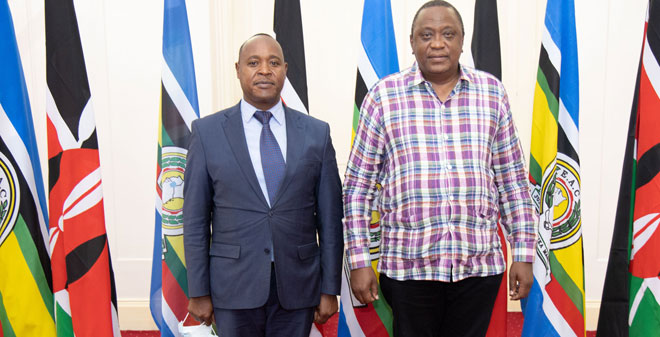
Nairobi, Kenya | THE INDEPENDENT | The East African Community has stepped up efforts to ensure the region starts manufacturing its own COVID- 19 vaccines, jointly. This comes as individual countries are battling the pandemic largely separately, with each having their own approach to vaccines.
The EAC Secretariat says that it has decided to prioritise strengthening partnerships between the private sector in the region and EAC Partner State governments to jointly invest in vaccine production in the region.
Uganda has so far recorded at least 95,000 COVID-19 cases and about 220 new cases daily currently, while at least 2,700 deaths have been recorded.
In Rwanda, about 75,000 cases have been recorded so far with more than 600 registered on Friday alone, while 874 deaths had been registered. Kenya has so far registered more than 210,000 cases and 4,000 deaths and is currently recording about 1,500 infections and 30 deaths daily.
The countries are at varying waves of the pandemic mainly because of the varying approaches used towards the pandemic. While speaking at the East African Business Council Kenya Chapter dialogue on the business environment in the region, the EAC Secretary General, Peter Mathuki, said that there was need for a coordinated approach in handling COVID-19 in the region and emphasized the need for local production of vaccines.

“EAC is working on strengthening partnerships between the private sector and EAC Partner States’ governments, to jointly establish investment in vaccine manufacturing, to ensure the region can produce and avail vaccines to East Africans,” he said.
He hastened to add that cross-border truck drivers in the region should also be included among the priority groups that need to be vaccinated. Last week, Kenya’s President Uhuru Kenyatta condemned what he called vaccine nationalism by the west, which not only had already produced vaccines but also had the money and other influence to buy off all from the market.
He told a three-day global education summit he co-hosted with UK Prime Minister, Boris Johnson that he wanted Kenya to move towards vaccine production because it has suffered as a result of vaccine nationalism.
In the region and much of Africa, Uganda seemed to be at more advanced stages of developing a COVID-19 vaccine, according to President Yoweri Museveni.
In June, he said by November this year, the locally developed vaccine would have reached the eighth and final stage.
“Making a vaccine involves eight or nine phases if WHO (World Health Organization) allows you to skip one phase. Our researchers are now entering stage four. We hope to get to stage eight by November,” he told the World Health Summit Regional Meeting in late June.
Less than 2% of Africa’s population and less than 1% in Sub-Saharan has been fully vaccinated, while some Western countries have achieved more than 70%. But even African countries that can afford to import significant volumes of the vaccine for their populations have limited access. Poverty alleviation crusader, ActionAid condemns the monopoly of the vaccines by the west and Western multinationals, which also leads to overpricing the vaccines for Africa.
“It is morally wrong that a country like Uganda, for example, is paying more than three times the price for the AstraZeneca vaccine than the far wealthier European Union countries. At this price it would cost Uganda more than double their entire national health budget to vaccinate everyone,” says the charity in its paper titled: Africa Needs a People’s Vaccine – a Covid-19 vaccine accessible to everybody free of charge.
“This unjustifiably higher price for African countries, combined with the high costs for administering the vaccines forces African Governments to make an impossible choice between vaccination and servicing debt as the debt crisis is looming hence compromising states’ efforts to realize core rights and obligations with respect to the right to health.”
Dr. Mathuki told the CEOs that he was pushing for a review of the EAC treaty and hopes the result will include regional collaborations on more issues like the medical, drug and vaccination industry. “There is a need for a comprehensive review of the Treaty and other legal instruments to reflect current EAC membership and provide mechanisms of resolving ongoing challenges. I am optimistic that there is a lot of goodwill around this, as this was also echoed by the President of the United Republic of Tanzania, Samia Suluhu, during the recent courtesy visit to by the EAC Secretariat,” Dr. Mathuki added.
The Secretary-General further disclosed that the Community was working on developing a harmonized framework for a collective response by the Partner States to COVID-19 in the region through the EABC and EAC Technical Working Group (TWG) launched last month. The East African Legislative Assembly Speaker, Martin Ngoga, urged the business community to avoid getting entangled in national politics and form a unified front.
“We should always look at intra-EAC challenges not through geo-political lenses but through the eyes of the collective private sector,” Ngoga said. The EAC has amended the EAC Customs Management Act to allow tax-free movement of COVID- 19 treatment and management related equipment, like medicines and diagnostic goods.
****
URN
The post VACCINES: EAC pushes for joint COVID-19 strategy appeared first on The Independent Uganda:.
from The Independent Uganda: https://ift.tt/3fHDv0G
0 Comments